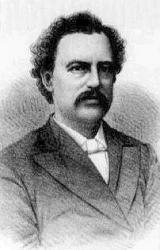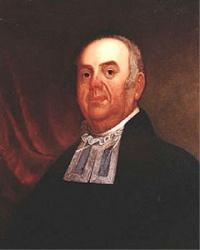Planning worship?
Check out our sister site, ZeteoSearch.org,
for 20+ additional resources related to your search.
- |
User Links
Search Results
[Hear the gentle Shepherd]
Appears in 8 hymnals Composer and/or Arranger: W. W. Bentley Incipit: 12346 55653 21234 Used With Text: Let Them Come to Me
[Hear the gentle Shepherd]
Let Them Come to Me
Author: A. H. A. Appears in 21 hymnals First Line: Hear the gentle Shepherd Used With Tune: [Hear the gentle Shepherd]
Let Them Come to Me
Die gute Botschaft
Appears in 4 hymnals First Line: Laßt die Heiden hören Refrain First Line: Bringt sie her zu mir Used With Tune: [Laßt die Heiden hören]
Die gute Botschaft
Kommet her zu mir
Author: E. Lorenz Appears in 1 hymnal First Line: Freundlich ruft mein Jesus Used With Tune: [Freundlich ruft mein Jesus]
Kommet her zu mir
Let Them Come to Me
Author: A. H. A. Hymnal: Joyful Songs #23 (1875) First Line: Hear the gentle Shepherd Lyrics: 1 Hear the gentle Shepherd,
Calling lambs like me,
In his sweetest accents,
Let them come to me.
Refrain:
Let them come to me.
Let them come to me,
Hear him sweetly saying,
Let them come to me.
2 He will bid us enter,
When our tired feet
Reach the golden city,
He'll be there to greet. [Refrain]
3 Thanks, dear blessed Savior,
For thy words of love,
Bidding children enter,
Thy bright courts above. [Refrain] Languages: English Tune Title: [Hear the gentle Shepherd]
Let Them Come to Me
Let Them Come to Me
Author: A. H. Adams Hymnal: Fair as the Morning. Hymns and Tunes for Praise in the Sunday-School #111 (1891) First Line: Hear the gentle Shepherd calling lambs like me Lyrics: 1 Hear the gentle Shepherd
Calling lambs like me;
In His sweetest accents:
Let them come to me.
Refrain:
Let them come to me,
Let them come to me;
Hear Him sweetly saying,
Let them come to me.
2 He will bid us enter;
When our tired feet
Reach the golden city,
He’ll be there to greet. [Refrain]
3 Thanks, dear blessed Saviour,
For Thy words of love,
Bidding children enter
Thy bright courts above. [Refrain] Topics: Coming to Christ; Infant Songs Languages: English Tune Title: [Hear the gentle Shepherd]
Let Them Come to Me
Let Them Come to Me
Author: A. H. A. Hymnal: Carols of Joy #65 (1882) First Line: Hear the gentle Shepherd Languages: English Tune Title: [Hear the gentle Shepherd]
Let Them Come to Me
Edmund S. Lorenz

1854 - 1942 Person Name: E. Lorenz Author of "Kommet her zu mir" in Pilger Lieder Pseudonymns: John D. Cresswell, L. S. Edwards, E. D. Mund,
====================
Lorenz, Edmund Simon. (North Lawrence, Stark County, Ohio, July 13, 1854--July 10, 1942, Dayton, Ohio). Son of Edward Lorenz, a German-born shoemaker who turned preacher, served German immigrants in northwestern Ohio, and was editor of the church paper, Froehliche Botschafter, 1894-1900.
Edmund graduated from Toledo High School in 1870, taught German, and was made a school principal at a salary of $20 per week. At age 19, he moved to Dayton to become the music editor for the United Brethren Publishing House. He graduated from Otterbein College (B.A.) in 1880, studied at Union Biblical Seminary, 1878-1881, then went to Yale Divinity School where he graduated (B.D.) in 1883. He then spent a year studying theology in Leipzig, Germany.
He was ordained by the Miami [Ohio] Conference of the United Brethren in Christ in 1877. The following year, he married Florence Kumler, with whom he had five children. Upon his return to the United States, he served as pastor of the High Street United Brethren Church in Dayton, 1884-1886, and then as president of Lebanon Valley College, 1887-1889.
Ill health led him to resign his presidency. In 1890 he founded the Lorenz Publishing Company of Dayton, to which he devoted the remainder of his life. For their catalog, he wrote hymns, and composed many gospel songs, anthems, and cantatas, occasionally using pseudonyms such as E.D. Mund, Anna Chichester, and G.M. Dodge. He edited three of the Lorenz choir magazines, The Choir Leader, The Choir Herald, and Kirchenchor. Prominent among the many song-books and hymnals which he compiled and edited were those for his church: Hymns for the Sanctuary and Social Worship (1874), Pilgerlieder (1878), Songs of Grace (1879), The Otterbein Hymnal (1890), and The Church Hymnal (1934).
For pastors and church musicians, he wrote several books stressing hymnody: Practical Church Music (1909), Church Music (1923), Music in Work and Worship (1925), and The Singing Church (1938). In 1936, Otterbein College awarded him the honorary D.Mus. degree and Lebanon Valley College the honorary LL.D. degree.
--Information from granddaughter Ellen Jane Lorenz Porter, DNAH Archives
Edmund S. Lorenz
W. Warren Bentley

Person Name: W. W. Bentley Composer of "[Hear the gentle Shepherd]" in Fair as the Morning. Hymns and Tunes for Praise in the Sunday-School
W. Warren Bentley
William Bentley

1759 - 1819 Person Name: Wm. H. Bentley Composer of "[Hear the gentle Shepherd]" in Joyful Songs William Bentley (June 22, 1759, Boston, Massachusetts – December 29, 1819, Salem, Massachusetts) was minister, scholar, columnist, and diarist. His ancestors were early Puritan settlers to New England. He lived with his grandfather, William Paine, a well-to-do landowner, who sent him to North Writing School at the age of six, where he studied Latin and Greek. At the age of fourteen, his grandfather enrolled him in Harvard University. After graduating, he taught at Boston Latin School North Writing School, and then became a Greek and Latin tutor at Harvard University while attending graduate classes in theology. He was one of the first New England minister to profess unitarian beliefs and was a close friend of James Freeman, the first minister in the United States to call himself a Unitarian. In 1783 he was invited to be a candidate for assistant minister at Second Congregational(East) Church in Salem, Massachusetts, where he served until his death. The senior minister was James Diman, a Calvinist, who opposed Bentley's appointment; Diman allowed him to preach but not to administer the sacraments. The congregation, however, preferred Bentley's more liberal views. He prized morality and good works over Calvinist grace and faith. He wrote twice-weekly columns for the Salem newspapers summarizing foreign and domestic news. He owned a very large library, second only to Thomas Jefferson's, and kept a diary all of his life.
Dianne Shapiro, from "Annals of the American Pulpit" by William B. Sprague, Vol 8, New York: Robert Carter and Brothers, 1865; and "Dictionary of Unitarian and Universalist Biography" accessed 1/29/2017
William Bentley


 My Starred Hymns
My Starred Hymns


